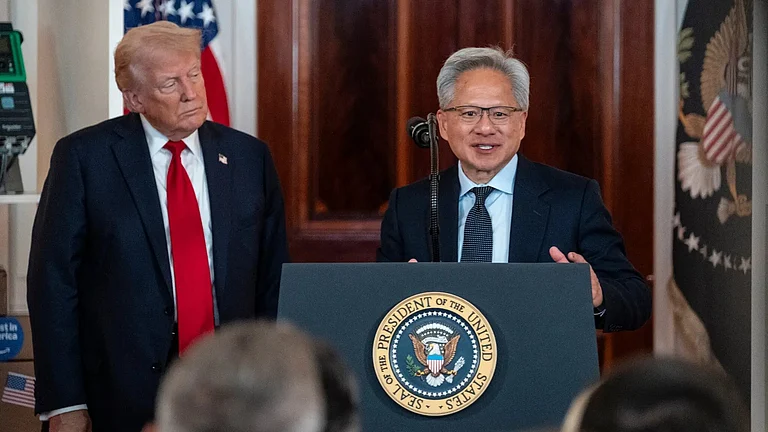
Trump secures 10% Intel stake worth $8.9B via Chips Act.
Deal marks rare direct U.S. intervention in corporate giant.
White House frames semiconductor production as critical national security priority.
Analysts warn Intel needs stronger demand despite government-backed expansion.
In a significant effort towards strengthening the struggling chipmaker and semiconductor production in America, US President Donald Trump on Friday signed a deal with Intel Corporation acquiring a 10 per cent stake in the company.
The deal given Washington access to 433.3 million Intel shares, that is equal to 9.9 per cent of the company’s fully diluted common stock. Intel has also confirmed that the $8.9 billion transaction will be funded by pending grants under the US Chips and Science Act and the Secure Enclave programme.
The total government backing for Intel now stands at $11.1 billion, along with an earlier funding of $2.2 billion Despite its size, the investment comes with no board representation or governance rights, making the US a passive shareholder.
Announcing the deal through a post on X, US Secretary of Commerce, Howard Lutnick said, “This historic agreement strengthens U.S. leadership in semiconductors, which will both grow our economy and help secure America’s technological edge.”
Intel Chief Executive Officer Lip-Bu Tan also said in a statement, “We are grateful for the confidence the president and the administration have placed in Intel, and we look forward to working to advance US technology and manufacturing leadership.”
Further referring to it a “great deal for America and Intel,” US President Trump said semiconductor manufacturing was critical to the nation’s future. “Building leading-edge chips is fundamental to our country,” he said in a social media post.
This 10% ownership stands as one of the most direct interventions in a US corporate giant outside times of war or financial crisis. According to the White House, semiconductor production is as a matter of national security, as the world is currently on the face of supply shortages that has disrupted industries.
Intel remains among the few American companies with the ability to produce chips on a large scale domestically. The U.S government hopes the investment will help restore the company’s competitiveness against Asian rivals.
In addition to that, the deal represents a shift in how Trump is applying the Chips Act, a law signed earlier under the Biden administration. While the act was originally structured to provide subsidies, Trump has argued that taxpayers should receive a return on such large investments.
Commerce Secretary Howard Lutnick, who helped finalise the agreement, pointed out that the administration wanted to secure more tangible benefits for the US economy rather than simply giving away grants.
Welcoming the deal, Intel CEO Lip-Bu Tan said that the company was committed to expanding its US manufacturing base, including new factories in Arizona. Many major technology firms, including Microsoft, Dell, HP and Amazon Web Services have also expressed support for strengthening America’s chip supply chain.
Analysts, as reported by Bloomberg, warned that money alone might not solve Intel’s long-standing challenges. “Besides funding, Intel needs more customers,” noted Bernstein analyst Stacy Rasgon. Without stronger demand, he added, even a government-backed expansion could struggle to pay off.


































